#if you have a different perspective- don't hesitate to explain your opinion!
Explore tagged Tumblr posts
Text
I find it very interesting what episodes you figure out where Eliot, Parker, and Hardison learned to trust each other vs. them believing in each other.
For Hardison The Nigerian Job is where he first started to trust Eliot. But I'd say that The Second David Job is where Hardison believed in Eliot. There's no distinct episode where I think Hardison started trusting Parker, but I do believe that The Stork Job is where Hardison believed in Parker.
For Parker she started to trust Hardison in The Stork Job, and believed in him in The Queen's Gambit job. She trusted Eliot in The Snow Job, and believed in him in The Big Bang Job.
For Eliot he trusted Hardison in The Second David Job, and believed in him The Iceman Job. Eliot trusted in Parker in The Two Horse Job, and believed in her in The Runway Job.
I hope that all makes sense. 😬
#leverage#parker leverage#eliot spencer#alec hardison#christian kane#aldis hodge#beth reisgraf#essay#when they learned to trust each other#verse when they learned to believe in each other#there is a distinctive difference between the two#i hope this makes sense#if you have a different perspective- don't hesitate to explain your opinion!#i would love to hear them
69 notes
·
View notes
Note
hi! i apologize if this is outside your ballpark. i recently came across a post about how religion appears in bbc's merlin and it got me thinking about religion in arthurian legend in general. i was wondering if you have any thoughts on the topic? what religions do the characters follow and how does it impact their lives? i know most of the 'cast' is christian but even then medieval christianity is different enough from modern christianity that i constantly feel like i'm missing some nuance/context when i read arthuriana. do other religions feature (such as judaism, islam, pagan spirituality) and are there any essays on it or books where that's explored? thank you for all you do and have a great day!
Hello!
So I’m definitely no religious scholar of any kind. Yet I somehow managed to write an obscenely long post in reply. I've provided copious amounts of literature on everything I'm discussing here, so I encourage anyone who sees this to read what's provided and form their own opinion. Although my reply is based on the Medieval stories I've read and quoted as well as the essays and books of people far more qualified than I am, it's still my own interpretation, and shouldn't be taken as the final word on this highly complex subject. If anyone finds something here I've gotten wrong, please don't hesitate to educate me otherwise and point me in a direction to learn more!
Without further ado...
The first thing anyone looking into this needs to understand is [most of] the Arthurian stories we have were drafted or documented by Christians, oftentimes monks (ie, people very devoted to their religion). Even the texts like the Mabinogion or The Welsh Triads, which contains no Christianity, wasn’t written down until the 12th century after the oral tradition had passed through the Christianizing of Britain. Not to mention translation bias, an oft overlooked factor. For example, French characters Lancelot and Galahad were retroactively added to The Welsh Triads to bring the Triads more in line with the widely popular French narrative. Translator Rachael Bromwich has excellent footnotes regarding this in the file I shared above. So just keep that in mind while reading/researching this subject.
More generally speaking, while some characters themselves aren’t Christian, such as Muslim Palomides or the occasional Jewish character, the texts are [mostly] from an overtly Islamphobic and antisemitic viewpoint. The depictions of religion in Medieval Arthuriana should never be taken as an indication of how things “really were,” either in the time it’s meant to take place (ie, the 5th-6th centuries when the Saxons were colonizing Britain) or the time/place it was written in (ie Chrétien de Troyes wrote from his own 12th century Breton perspective). Point being, it’s all very biased. Perception heavily depends on the place and year things were written and translated. If you're ever unsure which translation of a text will best suit your needs, whether that means accuracy, readability, or containing more robust footnotes, don't hesitate to ask.
That being said, the differences you’re touching on regarding Medieval versus Modern Christianity sometimes stems from Christian Mysticism, which was a prevalent theology in the Middle Ages and still exists today (albeit to a lesser degree). Some contemporary sources on this would be:
The Confessions by Saint Augustine of Hippo
The City of God by Saint Augustine of Hippo
The Book of Divine Works by Saint Hildegard von Bingen
The Letters of Hildegard von Bingen Volume I by Saint Hildegard von Bingen
The Letters of Hildegard von Bingen Volume II by Saint Hildegard von Bingen
The Book of Margery Kempe by Margery Kempe.
Now the thing with Christianity in history and Arthuriana is that the lines between orthodox practice and the mystical was blurred. On an episode about charms, the Medieval Podcast (also available on any podcasting platform like Spotify) explains how people bought and used charms all the time, even within their Christian practice. To them, it was a part of their worship. They may have chanted some words over a sick friend while anointing certain parts of the body in the hopes it would aid in healing. Depending on the time and place, this may or may not have been openly discussed for fear of repercussions or accusations of blasphemy, but it was common enough for historians to have gathered a multitude of examples preserved in spell books. To a desperate Medieval Christian, one of these charms occupied a similar place to Pray the Rosary or Hail Marys in hopes of boosting the success of their endeavor.
So in a similar vein, that concept is sometimes stretched for the sake of an Arthurian story. What you end up with are characters like Merlin, supposedly half-demon, but baptized, therefore his purified magic and prophesizing is considered "Christian;" Morgan le Fay, raised in a nunnery, yet learned necromancy from the holy sisters; and Gawain, who obtained his sun powers, as well as his name, from the hermit that baptized him. At least, so it goes in the Vulgate.
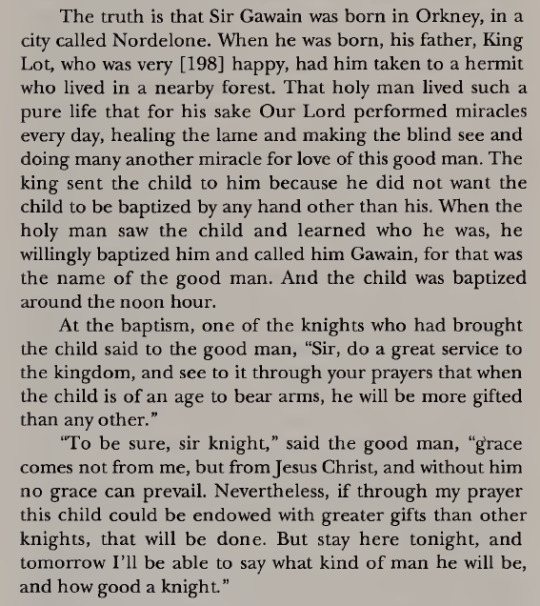
In a way, these people are not magical through their own power, but channeling the divine with the help of their Christian education in order to bestow those benefits, often health, strength, or prosperity related, onto others. (You'll see a lot of real life examples in the contemporary sources I linked above.) Vulgate editor Norris J. Lacy and his translation team left a footnote on the Gawain passage explaining the history of the Gawain/Gwalchmai character that lead me to theorize that this passage might be an attempt by Anonymous to maintain those heightened magical powers while offering a palatable Christian explanation for it.
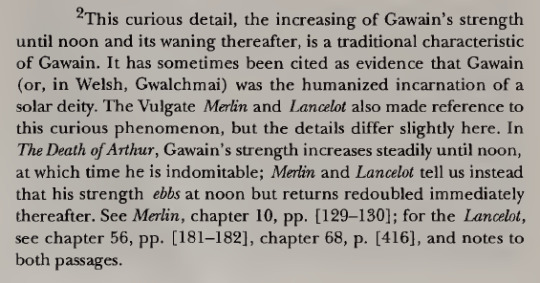
A similar phenomenon can be seen in Sir Gawain and the Green Knight, the characters are staunchly Christian, and yet the presence of a green-skinned knight astride a green horse who can survive a beheading is seen as marvelous, even miraculous, rather than monstrous. As Larissa Tracy explains in the essay Shifting Skin Passing as Human Passing as Fay, although the Green Knight is Othered by the court, he's not so Othered as to be held entirely apart. He's "tallest of men" and "half a giant." He is still one of the "in" crowd at least a little bit. So while his green coloring shocks the court, and calls to mind Otherworldly fay, in a way similar to the Lady of the Lake or other such beings, the Green Knight isn't viewed as an enemy of the crown so much as a chance for the court to prove its virtue. In the end, this Green Knight was indeed a man, Sir Bertilak, transformed by Morgan le Fay to take on the monstrous visage, and was indeed "one of them" all along. In this way, concepts which seem magical (read: Pagan) to the modern reader remain steeped in Christian ideals. This extends to Gawain's pentacle shield as well, sometimes misconstrued with a similar Pagan symbol, which the poem outright states represents the five virtues of knighthood or even the five wounds of Jesus Christ. Then again, Rhonda Knight's essay All Dressed Up With Someplace to Go: Regional Identity argues the opposite point, that there is indeed a divide. Knight asserts that the poet has intentionally heightened the dichotomy of insider/outsider, particularly as it relates to the Anglo-Welsh border between Sir Bertilak's Wirral and King Arthur's London Camelot. It's quite plain from the moment the Green Knight enters the scene there's a stark split between the two cultures, whether that be interpreted as the people of Wales and the people of England, or the Otherworld associated with Wales and the dominance of Christianity.
But anyway enough about Christians. Let's talk about my friend Sir Palomides and Islam.
A brief recap for anyone who's unfamiliar with Sir Palomides, he's a Muslim knight, referred to in the Medieval Christian tongue as a "Saracen," who vows to convert to Christianity for the sake of marrying Isolde, but curiously hasn't yet. His father, Esclabor, and both of his younger brothers, Segwarides and Safir, have already converted. Palomides is continuously ostracized for his religion/appearance throughout the narrative and considered lesser than Tristan. This is pretty much always the roles they play. Sometimes Palomides is treated with extreme cruelty, such as in the Post-Vulgate, where Galahad forces him to convert to Christianity at sword point, only for Palomides to be murdered shortly afterward by Gawain once his narrative purpose, ie successful conversion, has been fulfilled.
For this break down, I'm ignoring that portrayal of Palomides as well as the Prose Tristan because they suffer from the issues I already outlined regarding Medieval Christian's malicious depiction of non-Christians. And I hate them</3 We'll be turning our attention to Le Morte d'Arthur by Sir Thomas Malory instead as Palomides is slightly more nuanced there. (Very slightly. "The Good Saracen Sir Palomides" is a loaded sentiment, but Malory was a Medieval Englishman imprisoned for his crimes and writing through his madness. We work with what we have.) The copy I linked is translated by Dr. Dorsey Armstrong, not only because it's very good, but because she authored one of the essays I'll be sharing on the subject. She also has a 24 part lecture series on Arthuriana that I highly recommend.
In Le Morte d'Arthur, and the earlier published La Tavola Ritonda as well as Byelorussian Tristan, Palomides is treated a teensy bit better. In most versions of the story, Palomides misses an appointment to duel with Tristan out of cowardice or dishonor. But Malory has written a scenario in which Palomides missed the appointment not out of subservience to Tristan, but because he was jailed elsewhere and couldn't physically make it. He still gets his ass kicked by Tristan, but Malory's change shifts implicational blame of Palomides to circumstantial blame of his situation which serves to create a more sympathetic character. So while Tristan's perception of events remains the same, Palomides is given a narrative excuse which maintains his honor and integrity in the mind of the reader. Yet as Dr. Dorsey Armstrong points out in her essay, Postcolonial Palomides, after Tristan discovers Palomides suffering a bout of grief-induced madness, Palomides's ability to communicate breaks down, and Tristan is unable to understand him. Palomides occupies a space that his fellow "Saracen" knights, such as Priamus of Tuscany, don't. He's Othered by everyone in the narrative yet gains renown among the Christian knights in part because of his extreme desire to join the Round Table, while resisting the necessity to conform to a religious order and community which does not otherwise accept him. Unlike his father and brothers, Palomides seems more aware of, and resistant to, the predatory systems which dictate their conditional acceptance.
Race as a concept did not exist in the Medieval world, rather it was intrinsically tied to religion. That said, colorism was always present. "Saracen" is a term used to refer to Arab people, but according to Hamed Suliman Abuthawabeh, the etymology of the word itself stems from the color brown, ie referential of skin tone. As it relates to fiction... Ever wonder why the Holy Land of the Middle East in Arthurian Legend, where Galahad, Perceval, and Bors seek the grail, is called "Sarras?" Now you know. This concept is not limited to Middle Eastern characters either. Black people in Medieval stories are referred to as "Moorish," ie from the "Moorlands." To that end, ever wonder why Aglovale's half-Black son is named "Morien?" Or how about Parzival's half-Black brother Feirefiz, who's described as having a mixture of "white and black skin," half his father's "fair country Anjou," half his mother's "heathen land Zassamank" with a face two-toned "as a magpie." (Author Wolfram von Eschenbach and translator Jessie Weston's words, not mine).
The fact is non-white, non-Christian characters are often reduced to their skin color, not only in what labels are applied to them as people, but their religions and falsified homelands as well. The cost of a modicum of respect is total assimilation. It's all or nothing for these characters, and even then, it's not a guarantee. Aside from the especially harrowing treatment of Palomides in the Post-Vulgate, this concept appears yet again in the poem The Turk and Sir Gawain, in which Gawain continuously oscillates between foe and friend with an unnamed Turkish knight, only to conclude the story by violently converting this individual through beheading. The Turkish knight is reborn, now Christian, and at last gains a name and identity, Sir Gromer. The expectation put on Pagan knights is so great they must submit to their white comrades and allow them to, literally, kill their former selves to be worthy of personhood in Christendom.
The same can be said of Jewish characters in Arthurian Legend. They're not often the focal point, but they do pop up from time to time. In La Tavola Ritonda, there's Dialantes the Jewish giant, as well as the beautiful Hebrew damsel of Aigua della Spina, who's curiously married to a Christian knight. Then of course there's the rampant antisemitism in Chrétien de Troyes's Perceval, as well as the continuations, which blame "the treacherous Jews" for killing Christ, while also casting Joseph of Arimathea as a Christian knight who brought the Holy Grail to Britain. Furthermore in The History of the Grail portion of the Vulgate, Joe is said to have "converted to the faith of Jesus Christ" while keeping it secret for fear that "the Jews would have killed him." Tons of revisionism happening. The bulk of the Vulgate makes little to no mention of Jewish people, good or bad, as it's mostly tied to the grail story. That said, when it does come up again in The Death of Arthur, it's a slippery slope into every other prejudice, as the term has become synonymous with evil, particularly as it relates to women.
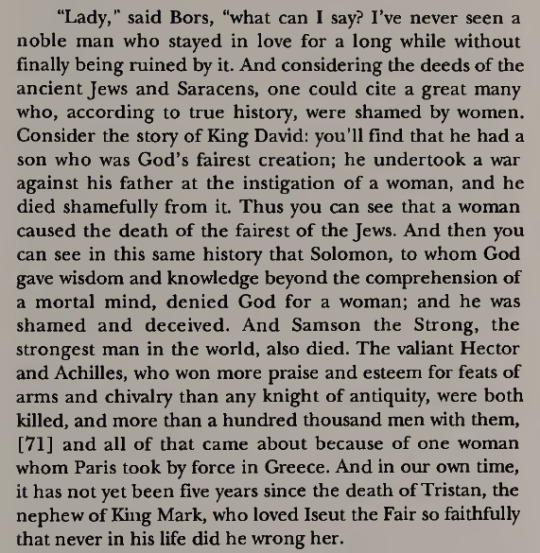
I couldn't possibly outline the entirety of Medieval Christianity's relationship with other religions in a single tumblr post. Here's a link to my huge folder about Race & Religion in the Middle Ages. The essays and books there discuss this subject in a general sense but there's a sub-folder with Arthurian specific essays to learn more about Palomides, Priamus, Gromer, Morien, Feirefiz, and other characters or texts that touch on race/religion.
Despite all of the above, it's not all bad. Sometimes an author was anti-racist toward the non-Christian characters, yet limited by their time. (Think how Herman Melville portrayed Polynesian Queequeg in Moby Dick, positively, but used phrenology to compliment the shape of his skull by comparing him to that of white people. Not up to modern standards, but an attempt at progressive for its time nonetheless.) Looking at Dutch Arthuriana, while Morien's name is an insensitive indication of his unnamed "Moorish" mother, the only characters in the story who treat Morien poorly, such as the boatmen who refuse to ferry him, are openly condemned, even threatened, by the Knights of the Round Table, including Gareth.
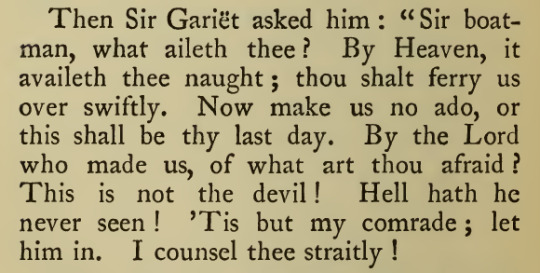
I don't know what to call this writing technique, but it's used (and sometimes underutilized...) today. Essentially, as a means to indicate to the reader that the views of the antagonistic (in this case, xenophobic and anti-Black) character isn't shared by the author, they include another character who refutes and combats the negative behavior and who accepts the oppressed party as they are. However rare, it does happen in Medieval texts.
Last but not least, I'd be remiss to omit the Hebrew King Artus from this discussion. It's an incomplete story, but sets out to retell the Arthurian Legend from a Jewish standpoint. All the characters are Jewish and all religious allusions that were once Christian have been rewritten as Jewish. It has a thorough analysis by the translator and tons of footnotes to indicate the Jewish references throughout the text.
Regarding religion in modern Arthuriana like BBC Merlin, Druids aren't actually present in the Legends, with the one and only exception being The Adventure of Melóra and Orlando, which does refer to Merlin as a Druid! There's also the connection made between Merlin and Stonehenge in The History of the King's of Britain by Geoffrey of Monmouth; the word "Druid" is not used, but Merlin describes his own ability to manipulate the stones as "mystical." One has to remember that Druids didn't write down their own history, as it was their way to memorize religious practices and not document anything. All we know about them comes from outside sources, such as Greeks and Romans as well as Christian missionaries come to convert them. As Christianity took hold and figures like Saint Patrick "drove the snakes [Druids] out of Ireland," much of that history was either lost or purposefully maligned. Did the Druids actually participate in human sacrifice? Who knows! Bearing that in mind, we must acknowledge the influence of the several revivals of Druidism and recent boom in Neopaganism; a lot of popular interpretations of Arthurian Legend are just that, the creator's interpretation, and not necessarily indicative of what the historical people would have been doing. To learn more about that, there's Druids: A Very Short Introduction by Barry Cunliffe which I found helpful.
When it comes to Merlin, or Myrddin Wyllt, his character is potentially based on a few different people who really existed, but there isn't a name given to whatever religion they practiced in anything I've read. While the time period did have clearly delineated religions such as Christianity, Judaism, Zoroastrianism (and then Islam), Mithraism, Druidism, etc, there were just as many people who prayed to Jesus Christ while simultaneously leaving out offerings for the local spirits. Most religions come with regional differences, various sects, or shift gradually over time. Saint Patrick himself is said to have had a "fluid identity," as his autobiographical work The Confessions paints him in a fairly positive light as a peaceful missionary, while Dr. Janina Ramirez indicates in her book The Private Life of Saints that other sources characterize Saint Patrick as an aggressor. Some scholars even believe Saint Patrick may have been two different people, combined over the centuries, similarly to Myrddin Wyllt. Modern Arthurian books and shows really lean into a dichotomy between Christianity and the "Old Religion" for the sake of entertainment. But bouts of unrest weren't as fantastical nor made up of two wholly separate, well-defined teams.
Wow this got long. I think we'll leave it at that. I hope that answers your questions! Take care!
72 notes
·
View notes
Text

Hi, welcome to my sideblog for original stories of fantasy, love and creatures! 🥀
I'm Debs and I've been on Tumblr for a while. During this time my content has been 100% dedicated to fanfiction, but this is my new space for non fanfic writing. I wanted to go back to this type of content for a long time and finally I did! I'm very excited about this project and I hope you have a great experience here as well 🖤
Important info about me, the content I'll be posting here and guides below the cut 🥀
About me
Name Deborah, but I'd rather be called Debs, as my irl friends call me like this
Pronouns she/her
Age 30
Country Brazil
What I do for a living I'm a History student and work at a part time job. Though I have accounts in other social media, Tumblr is the only one I "consistently" produce content to
Other info
I'm an INFP / my instinct stacking is SP/SX
Portuguese is my first language, but I've been writing and communicating in English for years and can read a bit of Spanish
I've always loved horror, fantasy, scifi and classic literature, and all these references has leaked into the content I've produced in different phases of my life. Recently, I've started writing content for anime fandoms, so this is probably the latest type of media to enter my list of inspirations. It'll certainly appear in this blog as well, yet I'll try not to write for specific fandoms, focusing on "fantasy" and "monster love" and original stuff instead of fanfiction
Links to my content
My main blog @cafeinthemoon93
My fanfiction sideblog @cafeinthemoon
My fanfiction lists @cafeinthemoon-lists
Find my personal posts and messages at #barely a human thought (soon)
Find my asks at #barely a human ask (soon)
Find my polls here at #barely a human poll
My ao3 account
My Quotev account
My Carrd
Rules, interacting with this blog, content and other important stuff
What I write I'll be writing "monster/creature x reader" stories. In some cases I might name the characters, but there'll be explainable reasons for this, otherwise I'll keep everyone "nameless" just like in most fairy tales. I plan to bring stories with elves, merfolk, mutants, aliens, forest creatures, mythological beings and others. I also want to write for non specified creatures. Though I don't write extreme/explicit content, the characters are always adult in my stories unless I specify them differently, so my content are primarily directed to adults
What I don't write Just like in my fanfiction content, I won't write noncon, underage, extremely dark content and explicit stuff. I also won't write for werewolves, vampires and zombies, specifically. I know they're very popular in fantasy and that writing for them might help to attract a greater number of people, but I just don't want to create content with them, and I'm not worried about gaining "fame". I just want to have fun. Also, that doesn't mean I won't write about creatures that resemble them 😉
Gender and pronouns I'll be writing all female reader x male or genderless creature. This is the only dynamics I'm able to write, for I work from my particular perspective. In the case of creatures with no specified gender, I'll be using "they/them", otherwise it'll always be "he/him". If you're not okay with this, don't send hate. Just seek for writers who create content that align with your preferences. There's space for everyone 😉
Warnings and triggers Just like in my fanfics, my stories are generally SFW, but I use to include steamy content and non explicit sex, as well as mentions of violence. I use warnings in all my stories, but in case you spot something that should appear in the warning content section, don't hesitate in telling me so. I'm not perfect and I might miss some things 🥴
About the word monsterf- and how I'll tag my stories I won't use this word to tag my content, but I'm totally okay if you want to classify my work as such. I'm new to this world and Idk if this is a sensitive topic among the community, but my personal opinion is that it sounds pejorative, and I see people laughing at its use. I don't approve laughing at this type of content, of course, but I'd rather use other terms like "monster love" and "monster romance", even though they don't have the same reach and impact
Asks and requests I'm accepting asks, including anon ones, and I'm open to new ideas for stories, but I won't be taking requests for headcanons for now due to my little time (besides irl responsibilities I have my fanfic content, so...). Maybe I'll take requests in the future, but for now I think it's too soon. Anyways if you have any doubts and want to discuss important points under the theme of this blog, I'll be happy 😊
What's not accepted I won't tolerate any forms of hate and prejudice, whether towards my content or other people. Spam and harassment won't be tolerated as well. The only possible responses for this type of thing are block and delete 🚫
If you've read until this point, tysm! I'm really happy to have you here and I hope you have great fun 🖤🥀
#fantasy story#fantasy series#monster lover#monster romance#dark fantasy#monster x human#monster x reader#monster x fem!reader#barely a human poll
10 notes
·
View notes
Text
@nekasu (x)

"And you are still not listening." Even after hearing everything she had to convey about her unease, he still clung onto the belief that he is justified for wearing away at her. That he had no part to play for her pain. To believe that it bears no validity just because he believed his intentions were not to hurt still does not justify nor diminish the fact that it does. What good is there to be achieved when he alone continues to shirk responsibility under the pretext of 'explaining his perspective'?
"You are doing exactly what you claim to not be doing. If you truly cared for my opinions or me even the slightest, you would acknowledge that you have caused me pain. Not prioritise explaining why you don't think you have or why I should see that you were not trying to." Was this how he treats her sister too? Or was it just because it is her that warrants such cruelty? "I do not need you to instill doubt in me. I alone am able to create such doubts, to analyse the situation and seek differing perspectives to close gaps in what I could not. If you believe that you have been fulfilling your role as an advisor, then you are sorely mistaken. All that you have done, all that you continue to do, is suffocate me. To poison me with so much distrust over my own capabilities that I hesitate and hesitate even further to conduct anything at all. That constant mistreatment is not something that would 'aid me in pushing past my doubts' or 'drive me towards improvements'. My ability to learn, to push past my doubts have all been hampered by your constant torment." Ridiculous. "I am not Makoto. I will never be her. I will never govern Inazuma the way she does. And I do not require you to make up whatever it is that you think I need. If you truly cared, you would ask what I needed and how best you could aid me. If you truly cared, you would accept that all your efforts to 'help' have only worsened things. If you truly cared, you would neither patronise me nor force me into mind games in order to ascertain what you meant. If you truly cared, you would trust me to do what is best for the people and plainly explained or guide me into areas where I am unable to relate to. Instead of speaking in vague expectation and then punishing me for not comprehending. You say your intentions were to aid, yet I only see your penchant for acting above all others and thinking you know better. And until you can reflect on where it is you have failed on your part to guide me, until you can reflect on how it is that you were cruel, I do not think we will be able to hold that conversation on equal terms. You are not hearing me. You are telling me how all you do was for my own good: And I am telling you now that it is not."
She may not be the perfect archon, nor is she one that her people deserved. But at the end of the day, Ei continues to persist in spite of never wishing to step into her sister's role in the first place. It is laughable for one who does not bear the weight of the entire nation on their shoulders to point, criticise, judge, preach and punish her for her efforts.
"What you have done is no different from what members of the Commission who colluded with the Fatui had done with the Shogun. Think about that."
21 notes
·
View notes
Text
I've been an amateur writer & reviewer for about 10 years now and I wanted to share my reviewing tips based on personal experience.
1. Don't be afraid to speak your mind:
When providing feedback on a story, it is crucial to express your thoughts and opinions without hesitation. Your perspective is valuable and can contribute to the growth and improvement of the story. By sharing your genuine thoughts, you create a space for meaningful discussion and potential enhancements to the narrative. You can mention the importance of maintaining a respectful tone while expressing your opinions. It's essential to be mindful of the language you use and to avoid personal attacks or insults. Emphasize the significance of fostering a constructive and open environment for discussion.
2. Understand the difference between constructive feedback and just being mean:
Constructive feedback aims to provide helpful suggestions and insights that can assist the writer in improving their story. It focuses on specific aspects of the narrative, such as plot, characterization, dialogue, or pacing, and offers suggestions for enhancement. On the other hand, being mean or overly critical serves no productive purpose. It often involves belittling or attacking the writer without offering any substantial suggestions for improvement. It's important to understand this distinction and ensure that your feedback is constructive and supportive rather than hurtful or discouraging. Elaborate on the importance of maintaining a balance between providing honest feedback and being mindful of the writer's feelings. Encourage writers to focus on specific examples, provide actionable suggestions, and highlight both strengths and areas that need improvement.
3. Explain properly why you like or dislike something:
When expressing your opinions about a story, it's essential to provide clear explanations for your likes and dislikes. Simply stating that you enjoy or dislike something without offering reasoning doesn't provide much value to the writer. By explaining your preferences, you give the writer insights into what aspects of their story resonated with you or fell short of expectations. Encourage writers to delve deeper into their analysis by considering elements such as character development, plot progression, writing style, pacing, or emotional impact. Providing specific examples from the story to support your opinions will make your feedback more valuable and actionable.
4. Don't take offense if the reader doesn't decide to take your feedback on. It's up to them:
It's important to understand that writers have the final say in how they want to shape their stories. While your feedback may be well-intentioned and insightful, it's ultimately up to the writer to decide whether to implement the suggested changes or not. As a reviewer, it's crucial to respect their creative choices and not take offense if they decide not to incorporate your feedback. Highlight the collaborative nature of the feedback process, where reviewers offer their perspectives, and writers consider and evaluate those perspectives based on their vision for the story. Emphasize the importance of maintaining a supportive and understanding attitude even if your feedback isn't adopted.
5. Remember, at the end of the day, it is just your opinion. You might not always be factually right:
When providing feedback on a story, it's vital to recognize that your opinions are subjective and may not always align with everyone else's or even the author's intention. Different readers have different tastes and preferences, and what might not resonate with you might appeal to others. Acknowledge that storytelling is an art form, and interpretations can vary. While you have the right to express your opinions, it's important to remain open to the possibility that your perspective might not be factually correct or all-encompassing. This mindset allows for diverse viewpoints and fosters a more inclusive and respectful feedback environment. Encourage writers to engage in open-minded discussions with the writer and other readers, welcoming alternative interpretations and appreciating the multifaceted nature of storytelling.
#writing inspiration#writing life#my writing#writers#writing#review#reviews#writing tips#tips and tricks#my experiences#experience#constructive criticism#constructive critism welcome#reading tips#reviewing tips
5 notes
·
View notes
Text
EP 5 - Realised (Part 2)

Q, my boy.... Put your curious soul aside for a while plssss.
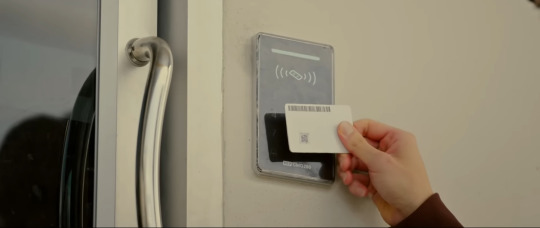
Stupid me was thinking he can't go in anyways and then I realised he had the damn keycard.
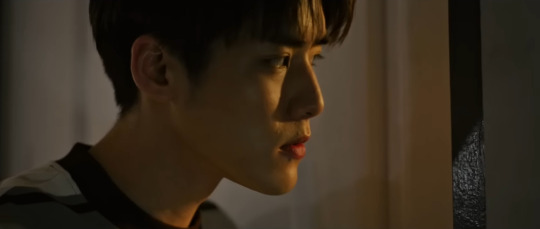
But also I see Q similar to his dad here. They don't try to run away from situations even if they know it's dangerous for them.
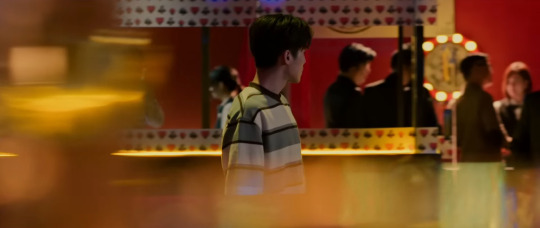
Baby, you look so out of place here. Get out of there rn.
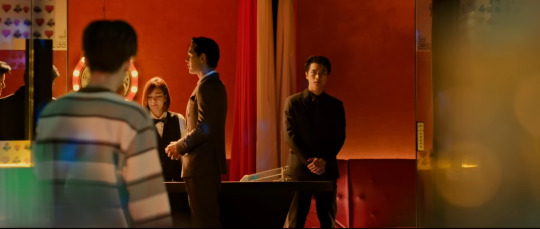
Sigh...

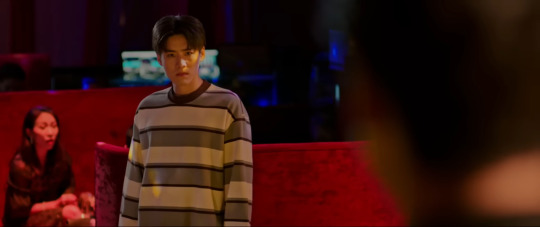
Honestly I loved both of their acting here. Like their faces show so much emotion I love it. The look of betrayal in Q's face and my interpretation of Min's expression is 'Don't misunderstand me! I can explain.'
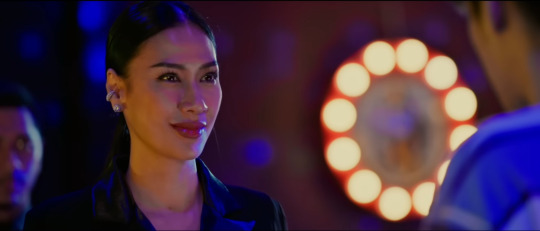
Q!!! I told you to get out of there.
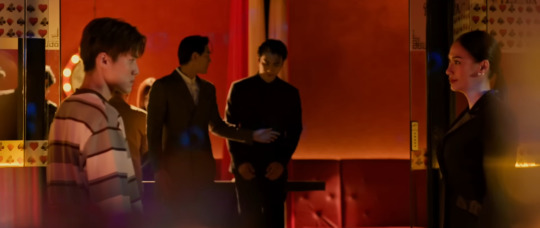
I saw a lot of people saying Q walks straight into danger. I agree but you all need to realise that trauma changes the way a person thinks. Q has adapted an almost reckless behaviour because he thinks no one would even care if anything happens to him. So, he doesn't really care that much for his life and safety. Thinking about this situation in a normal person's perspective will definetly differ from Q's perspective. It might seem stupid from our perspective but it is different when you see it from his point of view. It might seem like i'm defending Q but this is just my opinion.
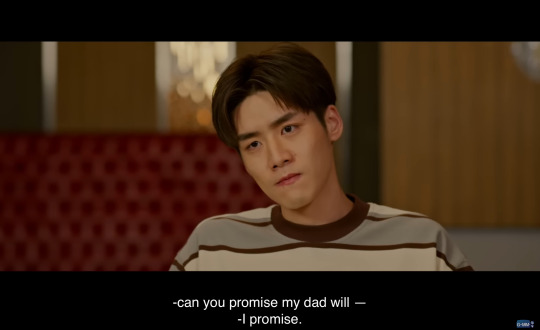
Q is willing to go as far as making a deal with the enemy just to ensure that his dad is safe.
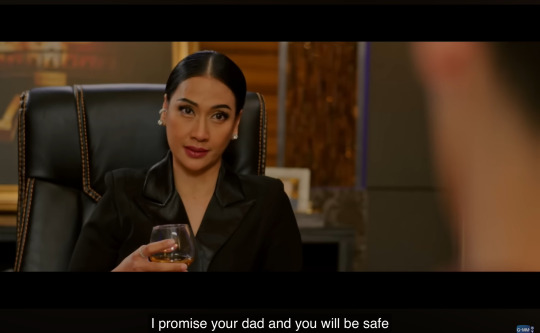
But we can't really trust Yada tho. There is no conformation that she wouldn't try to kill both Q and his dad just so that she wouldn't have any problems in the future as well.
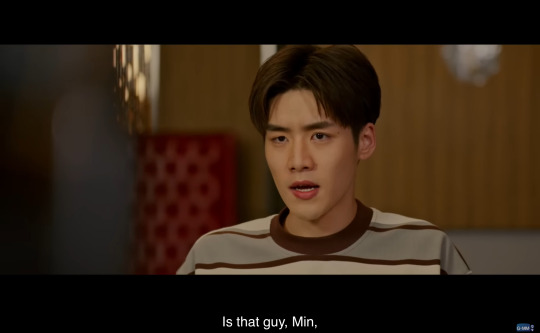
Q!! Why would you mention Min?!?
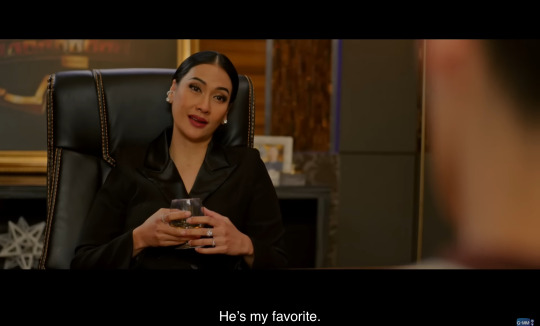
👀.
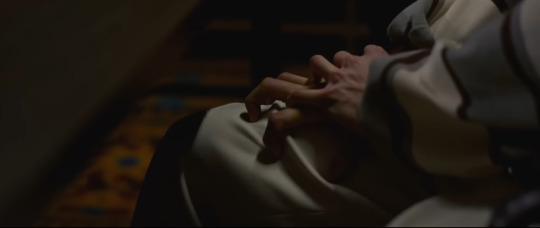
Come on Q! You need to get out of here!
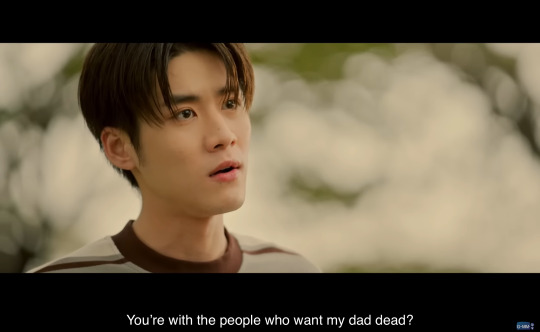
MinQ, I trust you both so so much in terms of communication. Pls don't disappoint me.
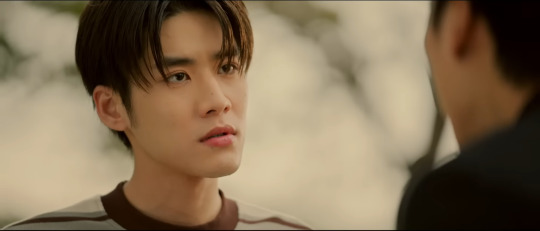
Q could have easily walked away here. He didn't have to listen to Min's explanation. But he stands there and listens to Min. I think his heart wants to believe that Min is not the bad guy.
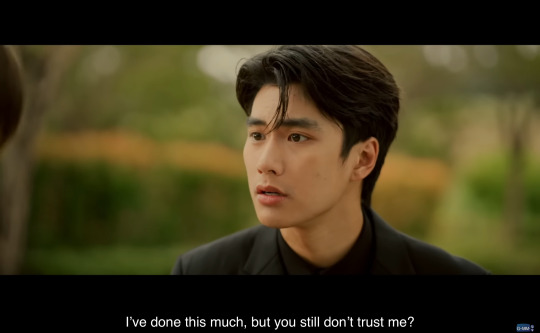
I understand Min tho. He has taken so many risks just to ensure that Q is safe when he quite literally could have killed him. It must hurt to see the person you're willing to risk so much for to not even trust you.
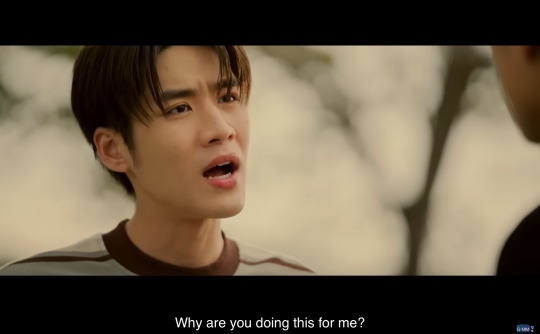
Like I already said before, Q just does not understand why someone would risk or sacrifice anything for him. He does not love himself enough to see himself worthy for sacrifice.
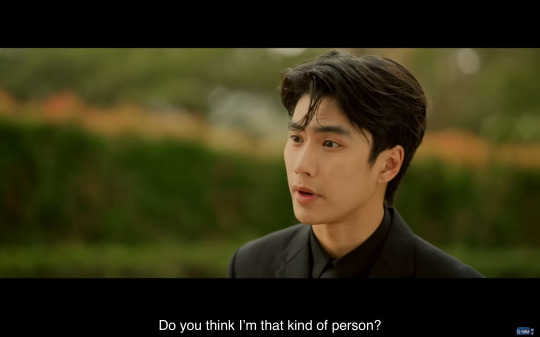
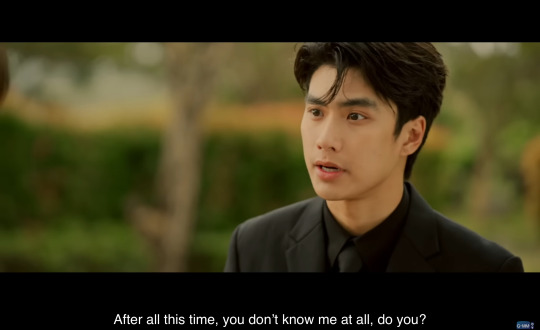
Min is hurt. Q is hurt. Now I'm hurt. 😢
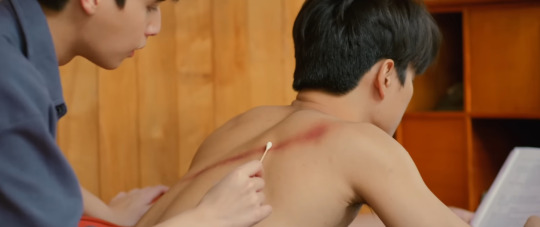
Ohhh he actually got hurt pretty bad.
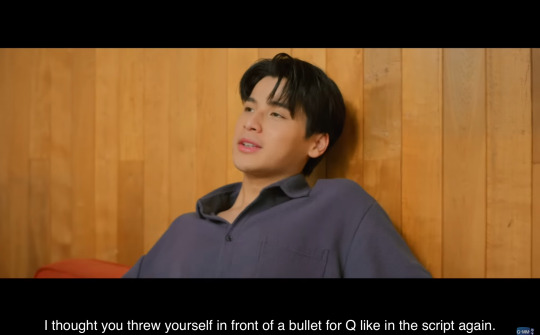
Mhen is never wrong.
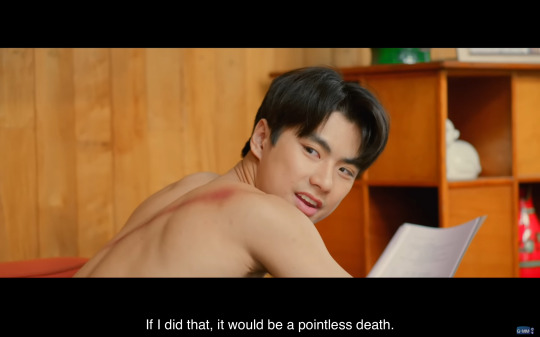
That's obviously not how you actually feel.

I just have to screenshot this uk. Ohm's got insane proportions like how does he do it??
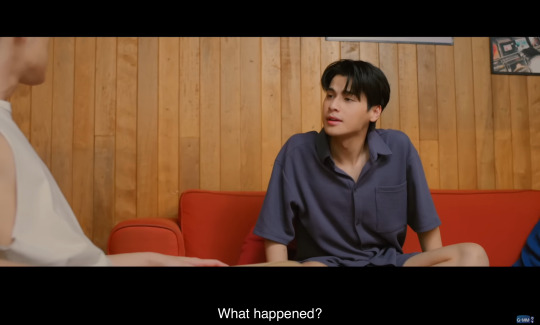
Mhen, c'mon let's fix your brother's relationship issues.
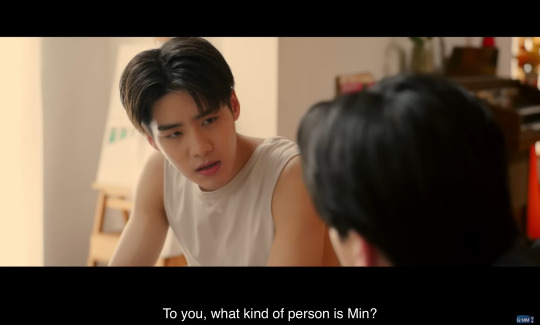
See I feel like Q is hoping that Min is as good as he seems. I think he has underlying feelings but hasn't yet confirmed it to himself like 'Yes! I actually like him'.
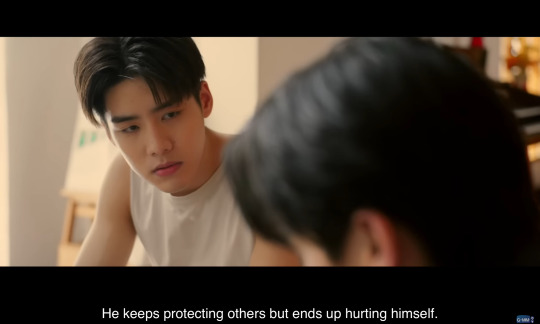
Facts! Min is the kind of person who would not hesitate to sacrifice himself for the person he loves.
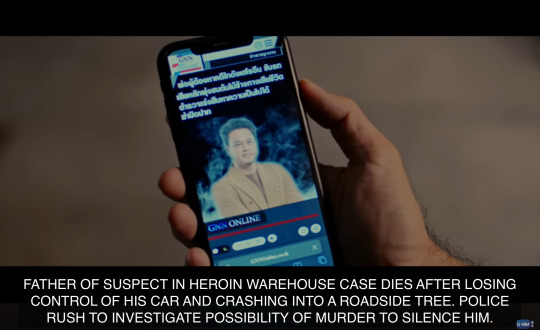
I fucking knew this was gonna happen.
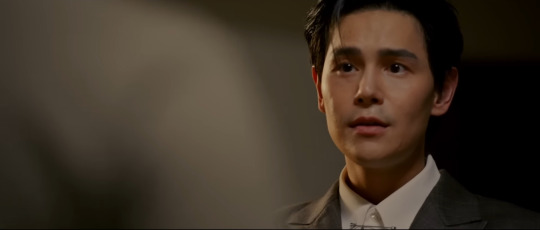
Hello???? Double agent!!! omg Suea I love this.
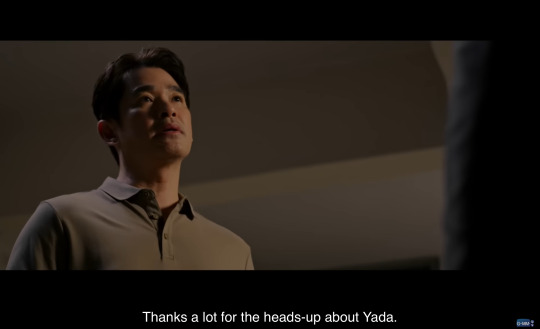
I think Suea might have been in the mafia world before but maybe some situation that changed him and he's decided to work with the police. I'm saying this considering that Yada trusts him so much, meaning he must have been with her for a considerably long time.
1 note
·
View note
Text
What Should You Know About Finding the Right Hiatal Hernia Surgeon for Treatment?
If you're experiencing symptoms like chest pain, heartburn, or difficulty swallowing, you may be dealing with a condition known as hiatal hernia. The first step in managing this condition is finding an experienced hiatal hernia surgeon who can provide you with the care you need. But with so many healthcare professionals available, how do you know who to trust with your treatment? In this article, we'll guide you through what you need to know about choosing the right hiatal hernia surgeon and why this decision is crucial for your long-term health.
What is a Hiatal Hernia?
A hiatal hernia occurs when a portion of the stomach pushes up through the diaphragm into the chest cavity. This can happen due to weakened muscles or increased pressure in the abdomen. Symptoms can range from mild discomfort to severe pain and complications, such as reflux or difficulty swallowing. In some cases, surgery is necessary to correct the hernia, and this is where a specialized hiatal hernia surgeon comes in.
Symptoms of Hiatal Hernia
Recognizing the symptoms of hiatal hernia is the first step toward getting proper treatment. Some common signs include:
Heartburn or acid reflux
Chest pain or discomfort
Difficulty swallowing
A feeling of fullness or bloating
Regurgitation of food or sour liquids
If you experience any of these symptoms, it's important to consult a healthcare provider as soon as possible for a diagnosis and possible referral to a hiatal hernia surgeon.
How to Choose a Qualified Hiatal Hernia Surgeon?
Selecting the right surgeon is crucial for a successful recovery. Here are some tips to help you choose the right hiatal hernia surgeon for your needs:
1. Look for Specialized Experience
Surgery for a hiatal hernia requires specific expertise. Surgeons who specialize in treating gastrointestinal issues, particularly those who have experience with minimally invasive laparoscopic surgery, are ideal candidates. You can usually find this information in the surgeon’s profile or by asking for their qualifications directly.
2. Check Reviews and Testimonials
Patient reviews can give you valuable insights into a surgeon's skills, bedside manner, and overall success rate. Look for a surgeon with positive feedback from patients who have undergone hiatal hernia surgery. Testimonials from real patients can help you gauge their level of satisfaction and whether they experienced any complications.
3. Consider the Surgical Facility
The hospital or surgical center where the surgeon operates should be equipped with advanced technology and provide high-quality care. A reputable medical facility will prioritize patient safety, comfort, and the latest surgical techniques. Don't hesitate to ask about the hospital’s accreditation and the experience of the surgical team.
4. Ask About the Surgical Process
A skilled hiatal hernia surgeon will take the time to explain the surgical procedure, including what to expect before, during, and after the operation. They should also answer any questions you have about the risks and recovery time. If a surgeon seems rushed or unable to provide clear answers, it may be a sign to consider other options.
5. Get a Second Opinion
If you're uncertain about the advice or treatment plan you've received, don't hesitate to seek a second opinion. A different surgeon may offer a new perspective on your condition and recommend alternative treatments or approaches.
Types of Surgical Procedures for Hiatal Hernia
There are a few surgical techniques that a hiatal hernia surgeon might use to correct the hernia, depending on the size of the hernia and your overall health. Some of the common surgical procedures include:
Laparoscopic surgery: This minimally invasive procedure uses small incisions and a camera to guide the surgeon. It results in less pain and quicker recovery.
Open surgery: In some cases, open surgery may be necessary for larger hernias or complicated cases.
Nissen fundoplication: This technique is often performed alongside hiatal hernia surgery to prevent acid reflux by wrapping the top of the stomach around the lower esophagus.
Your surgeon will discuss the best option for your situation based on the severity of your hernia and other health factors.
Recovery After Hiatal Hernia Surgery
After surgery, the recovery process can vary from patient to patient. In general, you can expect some discomfort, which can be managed with pain medication. It’s essential to follow your surgeon’s post-operative instructions closely, which may include:
Avoiding heavy lifting or strenuous activity
Gradually reintroducing solid foods into your diet
Attending follow-up appointments to monitor your recovery
In many cases, patients can return to normal activities within a few weeks to months, depending on the type of surgery performed.
Conclusion
Choosing the right hiatal hernia surgeon is critical to your recovery and long-term health. By looking for a specialist with experience, checking reviews, and understanding the surgical options available, you can make an informed decision about your treatment. If you're experiencing symptoms of a hiatal hernia, don't wait reach out to a qualified surgeon today to discuss your options and take the first step toward feeling better.
For more information or to schedule a consultation with a top-rated hiatal hernia surgeon, feel free to contact us. We're here to help guide you through the process and ensure you receive the best care possible.
0 notes
Text
Get a Medical Second Opinion: Your Right to a Second Chance

Understanding the Importance of a Second Opinion
In today's fast-paced world of medical advancements, seeking a second opinion has become increasingly common and essential. It's a powerful tool that empowers patients to make informed decisions about their healthcare. Whether you're grappling with a complex diagnosis, uncertain about a recommended treatment plan, or simply seeking reassurance, a second opinion can provide invaluable insights and peace of mind.
What is a Medical Second Opinion?
A medical second opinion involves consulting another healthcare professional to review your medical history, diagnosis, and treatment plan. This independent expert can offer a fresh perspective, confirm or challenge an initial diagnosis, and provide alternative treatment options.
When to Consider a Second Opinion
While seeking a second opinion is always your right, certain situations may warrant it more strongly. Consider getting a second opinion if:
Complex Diagnosis: You've been diagnosed with a rare or complex condition.
Controversial Treatment: The recommended treatment is controversial or carries significant risks.
Disagreement with Doctor: You have concerns or doubts about your doctor's diagnosis or treatment plan.
High-Stakes Decision: The decision involves a major surgery, chemotherapy, or other life-altering treatments.
Second Opinion: You simply want to feel more confident about your treatment plan.
The Benefits of a Second Opinion
Seeking a second opinion offers numerous advantages:
Confirms or Challenges Diagnosis: A second opinion can validate your initial diagnosis or uncover a different condition.
Provides Alternative Treatment Options: You may discover additional treatment options that better suit your needs and preferences.
Reduces Anxiety: Gaining a fresh perspective can alleviate anxiety and uncertainty.
Empowers You: Knowledge is power. A second opinion helps you become an active participant in your healthcare.
Increases Treatment Success: In some cases, a second opinion can lead to more effective treatment and better outcomes.
Finding the Right Second Opinion Doctor
Choosing the right doctor for a second opinion is crucial. Consider the following factors:
Expertise: Look for a specialist with experience in your specific condition.
Board Certification: Ensure the doctor is board-certified in their field.
Reputation: Research the doctor's reputation and patient reviews.
Accessibility: Consider the doctor's location and availability for appointments.
Insurance Coverage: Check if your insurance covers second opinions.
The Second Opinion Process
The second opinion process typically involves the following steps:
Gather Medical Records: Compile your medical records, including test results, imaging studies, and treatment plans.
Schedule an Appointment: Contact the second opinion doctor's office to schedule a consultation.
Review Your Case: The doctor will review your medical history and discuss your condition and treatment options.
Get a Written Report: Request a written summary of the second opinion for your records.
Cost and Insurance Coverage
The cost of a second opinion varies depending on the complexity of your case and the doctor's fees. Some insurance plans cover the cost of a second opinion, while others may require out-of-pocket payment. It's essential to check with your insurance provider to understand your coverage.
Tips for Getting the Most Out of Your Second Opinion
To maximize the benefits of a second opinion, follow these tips:
Be Prepared: Bring all relevant medical records and a list of questions to your appointment.
Communicate Clearly: Clearly explain your concerns and expectations to the doctor.
Ask Questions: Don't hesitate to ask questions about the diagnosis, treatment options, and potential risks.
Consider a Second Opinion: If you're still unsure after the second opinion, consider seeking a third opinion.
Conclusion
Seeking a medical second opinion is a proactive step towards taking control of your healthcare. It empowers you to make informed decisions and increase your chances of successful treatment. Remember, you have the right to a second opinion, and it's an invaluable tool for protecting your health and well-being. If you're considering a second opinion, don't hesitate to get in touch with a qualified healthcare provider today.
0 notes
Text
Consult Second Opinion Doctor Online India: Your Guide to Expert Medical Advice

Understanding the Importance of a Second Opinion
In the realm of healthcare, seeking a second opinion is a prudent decision that can significantly impact your treatment plan. With advancements in technology, consulting a doctor online has become increasingly accessible and convenient. India boasts a plethora of skilled medical professionals offering online consultations, making it easier than ever to get expert advice from the comfort of your home.
What is a Second Opinion?
A second opinion involves seeking medical advice from a different healthcare provider to corroborate or challenge a diagnosis or treatment plan. This process is particularly beneficial in complex or critical medical conditions.
Why Consider a Second Opinion?
Several reasons might prompt you to seek a second opinion:
Uncertainty about diagnosis or treatment: If you feel unsure about your medical condition or the recommended treatment, a second opinion can provide clarity.
Complex or rare condition: For intricate or uncommon diseases, a fresh perspective from another expert can be invaluable.
Disagreement with treatment plan: If you have concerns about the proposed treatment, a second opinion can help you make an informed decision.
Peace of mind: Seeking a second opinion can offer reassurance and alleviate anxiety about your health.
Benefits of Consulting a Second Opinion Doctor Online
Opting for an online second opinion offers numerous advantages:
Convenience: You can consult with doctors from anywhere, saving time and effort.
Accessibility: Online consultations break down geographical barriers, allowing access to specialists worldwide.
Speed: Get expert opinions quickly without waiting for appointments.
Affordability: Online consultations often come at a lower cost compared to in-person visits.
Privacy: Discuss your medical concerns confidentially from the comfort of your home.
How to Choose a Second Opinion Doctor Online
When selecting a doctor for a second opinion, consider the following factors:
Expertise: Ensure the doctor specializes in your specific condition.
Qualifications: Verify the doctor's credentials and experience.
Online reputation: Read reviews and testimonials to gauge the doctor's credibility.
Communication skills: Effective communication is crucial for a successful consultation.
Platform reliability: Choose a reputable online platform for your consultation.
The Process of an Online Second Opinion
Typically, an online second opinion involves the following steps:
Gather medical records: Compile your medical history, test results, and imaging reports.
Choose a doctor: Select a qualified doctor specializing in your condition.
Schedule a consultation: Book an appointment through the online platform.
Discuss your case: Explain your symptoms, diagnosis, and treatment plan during the consultation.
Receive a second opinion: The doctor will provide their assessment and recommendations.
Tips for a Successful Online Consultation
To make the most of your online second opinion, follow these tips:
Be prepared: Gather all relevant medical information before the consultation.
Communicate clearly: Explain your concerns and questions concisely.
Ask questions: Don't hesitate to seek clarification or additional information.
Take notes: Record important points discussed during the consultation.
Follow up: If necessary, schedule a follow-up consultation to discuss treatment options.
Conclusion
Seeking a consult second opinion doctor online india. With the convenience and accessibility of online consultations, it's easier than ever to get expert medical advice from renowned doctors across India. By carefully selecting a qualified physician and following the tips outlined above, you can make informed decisions about your health and well-being.
0 notes
Text
Expert analysis of the 51st selected work of Denny Ja: Muslim Poetry on Christmas
Hello! Welcome to the article that will discuss the 51st Denny Ja selected work, entitled "Poetry of Muslim Boy on Christmas". In this article, we will conduct an in -depth analysis of this work. Let's start! First, it is important to note that Denny JA is a famous writer in Indonesia. His work has been well received by the wider community, and he is known for his unique creativity and style of writing. The title of this work "Poetry of Muslim Bocah on Christmas" immediately attracted the attention of the reader. The combination of the words of "Muslim Boy" and "Christmas Day" may seem unusual at first, but that is what makes this work interesting. In his poetry, Denny Ja described the experience of a Muslim girl on Christmas. This shows the author's sensitivity to the various cultures and religions in Indonesia. By combining a typical Christmas moment with observations about a Muslim boy, Denny JA gives a fresh and unusual perspective. Denny JA's writing style in this poem is also interesting. He uses beautiful and descriptive language to describe the atmosphere of Christmas, as well as the feelings and thoughts of the Muslim boy. Through the use of the right words, he managed to liven up the atmosphere and build the imagination of the reader. The main theme that emerged in this poem was tolerance and unity. Denny Ja conveyed his message through a child's perspective. He shows that in the midst of religious and cultural differences, we can still live side by side with peace and mutual respect. In addition, Denny JA also pays attention to the small details that strengthen the story in his poetry. He explained carefully about the feelings of Muslim children when they saw Christmas decorations, hearing Christmas songs, and observing the celebration. This shows the author's attention to the details and abilities in creating a living atmosphere. During reading this poem, the reader can feel happiness, joy, and desire to understand each other between religions. This poem inspires us to respect differences and celebrate the diversity that exists in Indonesia. In addition, "Muslim Muslim Poetry on Christmas" also gives a picture of Denny Ja's sensitivity to the world of children. He explores the perspective of a child in a very authentic way. This is the extraordinary author of the writer, because it is able to dive into the mind and feelings of a child so well. This work also shows that literature can be a means to convey social messages. Denny Ja carefully packs his message about unity and tolerance in his literary work. This poem teaches us to open our minds and hearts to people with different backgrounds. In closing, Denny Ja's selected work, "Muslim poetry on Christmas," is a work that reflects the author's sensitivity to the diversity of religions and culture in Indonesia. With a beautiful writing style and the right choice of words, Denny JA managed to turn on the story and inspire the reader's feelings. This poem teaches us about the importance of tolerance and unity in the midst of differences. Hopefully the other Denny JA work will continue to inspire us all. Thank you for reading this article! If you have a question or want to share your opinion about this work, don't hesitate to submit it.
Check more: Expert analysis of the 51st selected work of Denny JA: Poetry of Muslim Boy on Christmas Day
0 notes
Text
Choosing THE Right Shoulder Specialist: Tips FOR Patients
When it comes to shoulder injuries and pain, finding the right specialist can make all the difference in your road to recovery. Whether you're dealing with a sports-related injury, a degenerative condition, or any other shoulder ailment, selecting the right shoulder doctor is crucial. Here are some essential tips to help you make an informed choice:
Seek a Shoulder Orthopedics Specialist: Shoulder injuries and conditions are complex and often require specialized care. Look for a physician who specializes in shoulder orthopedics. These experts have extensive training and experience in diagnosing and treating shoulder issues, ensuring that you receive the best possible care.
Verify Credentials: It's essential to verify the credentials and qualifications of the shoulder doctor you're considering. Check for board certification in orthopedic surgery and shoulder specialization. This indicates that the doctor has met rigorous standards of training and competence.
Experience Matters: Experience matters significantly in shoulder injury recovery. Ask about the doctor's experience in treating patients with similar conditions. Physicians with a substantial track record are more likely to have encountered a wide range of cases and can offer you a more comprehensive treatment plan.
Patient Reviews and Recommendations: Online patient reviews and recommendations can provide valuable insights into a doctor's reputation and patient satisfaction. Read reviews and consider seeking recommendations from friends, family, or other healthcare professionals.
Access to Cutting-Edge Technology: Shoulder treatments have evolved over the years, with advancements in surgical techniques and technology. Ensure that the specialist you choose has access to state-of-the-art equipment and stays up-to-date with the latest advancements in shoulder care.
Communication and Rapport: Effective communication with your shoulder doctor is crucial for your recovery. Choose a specialist who takes the time to listen to your concerns, explains your condition and treatment options clearly, and encourages questions. A good rapport with your doctor can make your treatment journey more comfortable and productive.
Consider Location and Accessibility: Convenience matters, especially if you require ongoing treatment or physical therapy. Choose a shoulder specialist whose clinic is easily accessible to you, reducing travel time and hassle during your recovery.
Insurance and Financial Considerations: Verify that the specialist you choose accepts your health insurance plan. Understanding the financial aspect of your treatment is essential to avoid unexpected expenses.
Second Opinions: Don't hesitate to seek a second opinion, especially for significant shoulder issues that may require surgery. A second opinion can provide you with a broader perspective on your condition and treatment options.
OrthoTexas and Shoulder Injuries:
For those seeking comprehensive shoulder care, OrthoTexas is a leading provider of orthopedic services. Their website, OrthoTexas - Shoulder Injuries, offers a wealth of information on various shoulder conditions, treatment options, and the expertise of their shoulder specialists. This resource can be a valuable starting point for individuals researching their shoulder injury and recovery options.
In conclusion, selecting the right shoulder specialist is a critical step towards a successful shoulder injury recovery journey. By following these tips and conducting thorough research, you can make an informed choice and take the first step towards regaining your shoulder health and mobility.
0 notes
Text
Choosing the right mechanic: Tips for finding reliable auto repair services
In today's fast-paced world, owning a vehicle has become a necessity for many. Whether it's for commuting to work, running errands, or embarking on road trips, cars play an integral role in our lives. However, like any complex machinery, cars are prone to wear and tear, requiring regular maintenance and occasional repairs. When faced with a malfunctioning vehicle, finding the right mechanic becomes crucial to ensure your car is in capable hands. If you are looking for a mechanic near me, here are some valuable tips for locating reliable auto repair services that will keep your vehicle running smoothly.
Ask for recommendations
One of the most effective ways to find a trustworthy mechanic is through word-of-mouth recommendations. Friends, family, coworkers, and neighbors who own cars can provide valuable insights into their experiences with local auto repair shops. Inquiring about their satisfaction level, the quality of service, and the overall professionalism of the mechanics can give you a good starting point.
2. Read online reviews
In today's digital age, online reviews are a goldmine of information. Platforms like Google, Yelp, and Facebook allow customers to share their experiences openly. By reading these reviews, you can gain insights into a repair shop's reputation, customer service, pricing, and the expertise of their mechanics. Look for patterns in reviews and take both positive and negative feedback into account.
3. Check for certifications and credentials
Reliable auto repair shops often have certifications and credentials that demonstrate their expertise. The National Institute for Automotive Service Excellence (ASE) certification is a widely recognized standard for automotive professionals. Mechanics with ASE certifications have demonstrated their knowledge and skills in various areas of vehicle repair and maintenance. This gives you added assurance of the mechanic's proficiency.
4. Visit the shop
Before committing to any repairs, visit the auto repair shop in person. Take note of the cleanliness and organization of the facility, as these factors can reflect the shop's attention to detail. A well-maintained shop often indicates that the mechanics take pride in their work and are likely to handle your vehicle with care.
5. Request estimates
When seeking auto repair services, it's essential to understand the cost implications upfront. Reputable mechanics are usually willing to provide detailed estimates that outline the scope of work, parts needed, and associated costs. Be wary of overly vague estimates or shops that hesitate to give you an estimate in writing. Clear and transparent pricing is a sign of an honest repair shop.
6. Inquire about warranties
Reliable auto repair shops stand behind their work with warranties. A warranty demonstrates the shop's confidence in the quality of their repairs. Before agreeing to any repairs, inquire about the warranty policy. Understand the duration and coverage of the warranty, and ensure that it's provided in writing.
7.Evaluate communication
Effective communication is essential when dealing with auto repairs. A trustworthy mechanic will take the time to explain the issues with your vehicle, the recommended repairs, and the associated costs. They should be willing to answer your questions in a way that you can understand, without resorting to technical jargon.
8.Consider specialization
Different auto repair shops may specialize in certain types of vehicles or specific repairs. If you own a specific make or model, consider seeking out a mechanic who has experience working with that brand. Specialized expertise can often lead to more accurate diagnoses and efficient repairs.
9. Get a second opinion
If a repair shop suggests a significant repair or replacement, don't hesitate to get a second opinion. Some issues might not be as urgent as they initially seem, and another mechanic's perspective can provide valuable insights. It's also an excellent way to cross-check pricing and ensure you're not being overcharged.
10. Trust your instincts
Finally, trust your instincts. If something doesn't feel right about a repair shop or a mechanic's assessment, it's okay to seek services elsewhere. Your peace of mind and confidence in the repair process are essential for a satisfactory experience.
Total Auto Repair (Montana Ave) - Euro Automotive Repair: Audi, BMW, Land Rover, Mercedes, Mini, Porsche, Volkswagen
10023 Montana Ave, El Paso, TX, 79925
(915) 229-7099
1 note
·
View note
Text
I think the conversation now is diverging from what prompted the original tags (me expressing frustration related to the 10th point). I don't want us to argue in circles about this, and that's an unfortunate state I think we may be nearing. Let me clear one thing up I'm seeing:
Regarding Emma getting a chance to choose a different path—You've mentioned several times that Emma used wanting help as a ploy. I believe you think this is a) something I don't accept despite it being very clear in the episode b) a sticking point that forces me to concede to your view (i.e., Emma can't be saved because she doesn't want to be saved).
Let me clarify: I agree that Emma attempts to use a fake ploy for help. At no point have I argued otherwise. My belief that Emma can be rehabilitated has nothing to do with me believing her false ploy. My belief that Emma can be rehabilitated has everything to do with the simple fact that she is only a few days old, she has been brainwashed, she has never been presented with other choices. Those are simple facts. I believe these facts and the fact that she hasn't actually hurt anyone mean she deserves a chance to truly realize she can and should choose a different path. At no point did I say she genuinely sought that path in the scene where she tried to kill Dean. I simply believe she was more than capable of getting there.
You may believe she will never change her mind and can't be saved, but again—that's your opinion based on a future we don't get to see. "Kill this person now to prevent them from becoming a monster in the future" is not usually a perspective Sam and Dean operate from. It's what the entirety of season 2 is about, and it continues and continues to be a rule they favor both before 7.13 and after. Hopefully now I have explained adequately enough for you to respect my perspective despite the fact that it differs from your own.
A few other random notes on new subjects you brought up:
She did it to save the life of her child and if her child was in imminent danger again, she would put his life above the lives of other people. This is something that Sam and Dean do as well with each other, but the narrative prefers them so tends to skirt around it in ways that don't feel as directly bad.
Some variation of "What Amy does is no different/not very different from what Sam and Dean do" is a popular view, but not one I agree on. I have a post about this here and a related post here.
Dean insisted that he wasn't going to let her walk His responses to her and to Sam later in the car back that up.
Because we disagree on the above, we also disagree (in spirit) on the following:
The entire thing with Emma played out in the open right between them, no secrets.
Sam certainly did do what he did right out in the open, but he did it specifically because he heard Dean say he would let Emma walk away, and Sam was not okay with that.
Following the sequence of events: Dean lets Emma in -> Dean draws the gun and tells Emma he was onto her from the beginning (completely true. We do not disagree on this.) -> While he holds Emma at gunpoint, Dean says he would let her walk away because she has not killed anyone.
We begin to disagree here. You believe this was the lie and what Dean said in the car after ("I wasn't going to let her walk") was the truth. I think the exact opposite (and so does Sam).
"You haven't killed anybody yet, Emma. Walk away" is a statement wholly consistent with Dean's personal ethical code as seen in episodes like 1.14, 2.03, 2.10, 4.04, and 7.03. It is especially true of how Dean responds to children, and we have a direct example of Dean letting another child who wants him dead go just 10 episodes before in 7.03. Dean tries to lie to Sam about his intentions to get Sam off his case. It does not work, because Sam overheard him say it. We also see Dean's hesitation in the way Dean falters when Emma begs him, "Please don't let him hurt me" and Dean looks at Sam helplessly—his gun lowering slightly.
But honestly, that's not what makes Dean's choice to kill Amy feel asshole-ish. It's that he did it behind Sam's back.
We agree that Dean doing this behind Sam's back was the wrong call. We may or may not agree on how severe of a wrong-doing this is compared to killing serial murderers vs. brainwashed kids. I don't know if we do or not, but it doesn't really matter. I feel I've explained myself well enough.
If we want to talk asshole moves, another one is being so furious that your brother might want to give his own daughter a chance that you shoot her and then immediately lecture him in the car about how he dared to hesitate to shoot his own kid, and then tell him his kid was not really his kid to try and make his hesitation sound not only unfair but also completely irrational. I don't know—do we need to all compare notes about who's the worse brother, or is it enough to acknowledge all of this only started yesterday because someone got some hate mail from samgirls about how Sam is a bastion of moral goodness pure precious cinnamon roll who is too precious for this world, who has never done anything wrong in his entire life and always always cares about the sanctity of human life while Dean is a Bad Man™️, and that, adjacent to that subject, there has been a persistent fandom claim I've seen a lot this year that his daughter doesn't matter, while everyone else Dean ever killed or thought of killing where it might have been slightly questionable is the end of the world.
#okay wait do y'all think that she wasn't going to try and murder Dean?#Do you think he was going to get through to her?#convince her somehow to not try to stab him?#that she was telling the truth at all in that scene?#because she was totally going to try and kill Dean#like 100% that was going to happen#and if Sam hadn't shot her then Dean would have had to kill her and that would have been so much harder on Dean#like it was disturbing that Dean had a 3 day old monster child that wanted to kill him but who was then killed by her uncle Sam instead#and even more disturbing that they then never mention her again#but these are also the guys who left their half brother in Lucifer's cage and didn't lose any sleep over it so...#and I love Dean but killing Amy was an asshole move#and there's kinda a difference between killing an active imminent threat and killing someone in cold blood after the fact @jinkieswouldyoulookatthis
I didn't want to clutter someone else's post but this was partially directed at me? I've talked about the whole "Emma vs Amy" debate quite a few times, but I'll share a few thoughts.
Amy is a present, unrepentant, fully cognizant, adult, serial murderer. She is not actually sorry about what she did in any way. She believes that slaughtering humans like cattle to feed them to her son was the morally correct action even if it wasn't the ethical action because it kept her son alive. She is not correct.
Emma is a brainwashed child who's been psychologically conditioned for a few days. She has never killed anyone and only wants to kill Dean because some women who abused her told her to.
Hunters like Sam and Dean primarily deal in punitive justice, not preventative justice—and what I mean by that is that Sam and Dean try not to kill people (with powers or without powers) who have never killed anyone.
While I think you're right to point out that a preventative justice component is in play, that is not primarily how Dean makes the decision to go after Amy, and the reason we know that is because Amy's son swears to kill Dean and Dean does nothing about it because the boy has done absolutely nothing wrong.
Dean's application of his personal code is consistent here. He kills Amy, who is a murderer who killed four people, but he does not intend to kill Emma or Amy's son—both of whom wanted to kill him—because neither has actually killed anyone and both may choose not to.
You say that Emma was going to kill Dean 100%, but you don't actually know that because we never got to see that future. You assume Amy would never have killed again, but when you add up "murderer who regrets absolutely nothing" and "child vulnerable to catching illnesses" you get "Mom who absolutely would kill again as necessary and who would feel zero remorse doing so just like the last time".
I don't personally think SPN gives us any reason to suspect that three days of psychological conditioning from a cult is too much to overcome. We have seen other characters overcome much more serious levels of psychological conditioning intended to make them killers. For example, Cas and Alex. I'm not saying Emma wasn't trying to pull the wool over Sam and Dean's eyes in the scene where Sam shot her, but I am saying that doesn't actually mean in any way that she couldn't be convinced to actually choose a different path.
Under the same litmus test with which you suggest Emma's condemnation, we'd also condemn season 2 Sam for his potential "future" crimes. We are killing monsters before they actually become those monsters... because of the dark path someone else intends for them to go down. Amy—again—is an active present unrepentant serial killer.
I think sometimes people misremember the scene where Sam kills Emma—recalling the scene as a scene where Emma lunges at Dean with the knife and Sam steps in just in time to save his life, or where Dean is unarmed and Emma has him at knife point. But that is not what happened. Emma quite literally brought a knife to a gun fight. Dean had a gun pointed at her, and if she was thinking straight at all, she would have left to avoid being killed if given the chance—especially when Sam arrived. And had she not, Sam could have shot her at that point—but Sam didn't wait to see what she'd do. He wanted her dead, because even if she ran, he didn't think they were equipped to deal with surprise attacks from Dean's Amazon child. That is the decision Sam made after a brief moment to consider, and it makes sense to me given the headspace he was in at the time and his assessment of Dean's headspace as well, but it does not make his decision consistent with his previous or future behavior regarding people who have been psychologically conditioned to kill.
My own frustrations are more with fandom, for a thought process that really really does not make sense to me, where Emma deserves to die but Amy deserved to live. I do not agree with that premise. I do not understand why so much of fandom has the perspective that a child who hadn't shed a drop of blood and who was acting in response to a cult's torture, who brought a knife to a gun fight and had already been driven into a corner where she had no choice but to surrender or run—doesn't deserve a chance to choose something else before she's barely lived and before she's heard a loving word in her entire life, but an adult with full cognizance of their actions who went through with killing four people and doesn't regret it should go on with their life and is "just a good mom doing what she had to" and killing that person is the bad thing. I don't understand that. I don't think Dean killing Amy was wrong at all in the "hunters kill supernatural murderers" show. The only thing Dean did wrong was lie about it and not take enough care to keep her son from seeing it happen.
#again what I was questioning was double standards in fandom#and the need to viscerate dean for things that make total sense#while defending sam to the end for things that are equally or more questionable or dismiss what he did/the people he hurt#Sam is always justified but all Dean's transgressions need to be obsessively analyzed#It happens constantly all of the time over and over and over and over in fandom.#Meaning—there was a context to all that bitching and moaning yesterday it didn't come out of nowhere.#emma#season 7#7.03#7.13#amy
296 notes
·
View notes
Note
Would you mind giving me a crash course on writing plurality? It interested me the moment I read your analysis on Raph being plural, even more so when I went after the links in the post.
I'm going to be completely honest and upfront first. Writing Plurality can be hard when you know nothing about the community or only know how the media presents DID. Plurality is a diverse experience, so it's going to challenge your choice of perspective in your story, word choice, and self-awareness when you're falling into demonization about the experience. Especially when characters can be stereotypical and fall into demonization "easily."
Writing a system is like writing a disabled character, a neurodiverse character, a cluster b character, a POC character, and so on. It takes a lot of understanding and discovering things you will have no idea how to explain because you've never experienced them or just don't know how to comprehend them. But the most important rule to writing any character(s) that go through things you don't is to remember that as long as you try your best, admit your mistakes, fix your errors, and never stop learning. You'll be able to achieve what story you want to tell with these characters.
Like any community, you have a lot of different opinions, and the views from the community you're trying to write about are something you've got to at least have a basic awareness of. Because understanding what may be seen as problematic or what might cause someone to come bursting into your comment section on a fic or so on will help you decide whether you're going to change what this person takes issue with or keep it despite their beliefs on it.
That doesn't mean you get to brush actual problematic things off, though. It's just a fine balance, especially if you're singlet.
But with that out of the way! I will try my best to give a basic crash course on how to write Plurality. Now, I'm a very understanding, patient, detail-orientated person, so if you or anyone else needs to ask questions or need me to "dumb" things down, please don't hesitate to do so! This is a safe space; I enjoy teaching people and bringing more acceptance to issues and experiences many people don't understand, so it's okay to make mistakes here with the intent of fixing them!
It All Starts With You
The first step to writing Plurality is to start with you. Now you might think, "What do I have to do about writing a system? Why does it matter that I've gotta start with myself first? :/" Well, I'll give a simple answer:
Everything you write reflects who you are as a person and what work you're willing to do for your writing.
Now, I don't mean reflecting yourself as in, "Oh no! You write about murders, so you must be a murderer!" No, I mean how you perceive yourself, the world, and others affect your writing.
An example of this is one of my favorite books, Life of Pi by Yann Martel. The author enjoys learning and believes in the ability to participate in multiple religions, so the character Pi in his story holds that characteristic, affecting how the story is written. I suffer from intrusive thoughts, so I write Mikey from ROTTMNT with pure O OCD (someone whose OCD doesn't showcase/have outward compulsions), which affects how I write his interactions with the environment and his internal dialogue.
Why this is important is because if you believe there is such a thing as an "evil alter," that only disordered systems are true systems, and/or that there's no such thing as Plurality and people are just faking it, it'll show in your work whether you want it to or not. So, it's important to tackle your stance on Plurality. How who you are and what you believe and participate in affect how you write a system.
I'll use myself as a perfect example! I'm very open-minded, but I'm very afraid of ghosts and demons. So when I learned that Possestive Systems were a thing, it scared me because the idea of being possessed makes me scared. I'm still afraid of demons and ghosts, but it no longer affects my interpretation and understanding of possessive systems.
I'm not religious, but I love learning about religion and how people interpret it so learning about Spirigenic Systems was super cool! I believe endo systems deserve respect and exist. I also think that persecutors do not deserve to be treated unfairly, negatively, and purposefully hurt by their systems or those outside the system. They also deserve respect and understanding.
This shows in my writing because I write Raphael as a diversian median system with a mixed origin with truamagenic and endogenic origins. I've made a few posts about Leonardo being a non-truamagenic system with non-religious spiritual connections to his ancestors (here, here, and here). I have even blatantly had Leonardo state in my Figuring It Out series the same perspective I have about Plurality:
In summary, Leo's brother is a part of a system, and if anyone were to ever make Raph, or Mind and Red for that matter, feel awful about that in any way, he and his brothers and sister would fight them without hesitation. There was nothing wrong with being a part of a system, and anyone who disagreed could eat a dirty, used pizza box for all they cared. Red and mind are a part of their family, and no idiot could ever change that.
Becoming aware of how Plurality makes you feel, think, and do is important, so while learning about Plurality, it's good to take time to assess why things make you feel this way or that way. Why you don't want to even try and write that experience but feel drawn to write about that one.
And, by the way, it's okay not to write some experiences! I don't write much about DID systems, but a friend of mine does! A part of writing systems is writing what is most interesting/relatable/understandable to you! There will always be some system that resonates with a characteristic you've written about, and it's okay if you can't write some system experiences perfectly or at all!
This leads to the other half of what I said, that who you are will affect the amount of work you'll put into writing about Plurality, and I shall use myself as another example to help you understand what I mean.
I am extremely passionate about learning about Plurality, so I am heavily involved in the community. I follow a lot of Plural blogs, have Plural friends, am a part of Plural discord servers, in activism, spend my time teaching others about Plurality, and have spent hours reading through Plural systems experiences over genuine, literal years. Because of this, I am very knowledgeable and deeply understand Plurality that not many singlets and even some systems have an understanding of. (This doesn't mean I am an expert and all-knowing, however. Please remember this. I am not a professional). I am willing to put years of research and interactions with the community into a piece of writing.
You may be the same way, or you may just want to only know enough to get the basics down to a T, which in my opinion, is valid if done correctly! Understanding how willing you are to dedicate yourself to learning about Plurality to write it is just as crucial as understanding how you feel about it and tackling any Pluralphobia or hatred you have towards the community/experience.
TL;DR: You have to figure out how you feel about Plurality and make sure you fix any issues you have towards or about Plurality. You have to understand how far you're willing to go to write Plurality, whether it's dedicating years to it or just wanting to know the basics.
Where to Learn About Plurality
Since I've spent years dedicating a portion of my life to learning and helping the plural community, I know a couple of ways that you can learn about Plurality for yourself and for your writing (because it is crucial you research before writing something). If you enjoy a laidback way of doing it, I recommend following blogs! If you want to read a lot, I recommend the dictionary! If you talk to the community directly, I recommend certain blogs, discord servers, and spaces where learning is the main idea!
Never just barge into any system/plural safe space with questions and concerns unless you know for certain they want to teach you. It isn't anyone's job to teach you or spend their day explaining what you want to know. They are beings with lives of their own, and they do not owe you anything. Respect is important; if you don't respect a system's time, boundaries, and wishes, you are in the wrong period. It is always important to ensure that you're asking questions and talking to systems that want to answer your questions with respect and patience.
Here are the blogs and sites I recommend interacting with if you're not sure where to start (I will take any mentions off if those I've mentioned would rather I not @ them):
@mixed-origin-system-culture-is
@funnier-as-a-system
@positively-plural
@dear-systems
@persecutorlifeandsupport
@endo-memes
@non-traumagenicsupport
Pluralpedia
Power to the Plurals
I am available to ask questions or get to know Plurality better, but as I said before, I am not an expert; I am not all-knowing; I am simply one opinion/experience in a sea of many, many others. Do not take my word as law and an end-all.
I recommend following and interacting with open communities specifically for the kind(s) of Plurality you want to write. This will help you in writing system experiences/struggles/achievements/interactions relating to those experiences you choose to write about.
TL;DR: To write Plurality correctly and to the best of your abilities, you have to learn about Plurality in the best way that suits your learning needs. Also, systems don't owe you anything. Respect them.
What to Avoid and How to Avoid it
Now, because there are a lot of stigmas, demonizations, misinformation, and discourse about systems, I am only going to talk about the main things you should always or at least try to avoid.
1) Gatekeeping Plurality
Whether you're a system or a singlet, this is extremely important to remember. It is not your place to dictate who, when, or what is deemed "Plural enough," especially system experiences you/you& do not experience yourself/yourselves.
You should avoid gatekeeping since it excludes systems from communities, help, and safe spaces. It's awful, and it hurts systems a fuck-ton. It's something that gets on my nerves because exclusion is literally the absolute worst. Excluding beings/groups/communities/experiences literally does nothing but hurt those just trying to exist. And it's never okay to hurt others on purpose.
As someone who's super open-minded in the way that I am, it's honestly difficult for me to gatekeep, but here's what I have heard that might help keep you from gatekeeping:
Not everything is about you. You may not get/need it, but that doesn't mean it doesn't exist/someone needs it.
The existence of something/someone doesn't mean less for someone else who isn't a part of that group.
If it isn't hurting anyone, it's not a problem. (There may be struggles or a change that needs to be made, but that doesn't mean it's necessarily hurting someone/a group.)
Everyone is capable of change, and that's okay.
Everyone makes mistakes, and that's okay.
Everyone is allowed their own opinions, and that's okay.
There are no rules for how being exist.
2) The So-Called Evil Alter(s)
We've all seen those characters in media that have that one side/alter who is slapped with the label of being evil. A perfect example is the Goblin from Spider-Man, the Beast from Glass, and literally any media you consume that has DID villainized. When writing Plurality, it is your job to avoid hurtful and harmful stereotypes such as the "Evil Alter."
The reason it's important to avoid falling into the stereotype is simple: It's overused, demonizes, stigmatizes, villainizes, and continues to push forth the idea that systems are to be feared. Systems are real and valid, and creating fear around their experiences and existence causes real-life problems. If you're choosing to write about marginalized groups (just like drawing, it should be something you practice/incorporate often), you must always keep this in mind. What you write affects real beings. Write responsibly.
The best way to flick a middle finger to the evil stereotype is by ensuring that a headmate is well-rounded, an actual individual instead of a plot device or just a flat character. It is okay to have characters who may fall into stereotypes, be a persecutor, or do bad things because they're a being; they're capable of such things. But you have to make sure to get across to the audience that they are not evil. You can do this by not having a headmate be the antagonist in the story or filling the common roles a villain does in most stories.
If you're incapable or aren't sure you can write a character like that, avoid writing headmates who can fall into being a villain in your story. If you're sharing your work publically, it's best not to incorporate it at all, but I highly recommend practicing privately on how to write demonized headmates in a stigma-free light in your own time and pace. You're going to fail at first; what matters is that you're trying.
3) Writing Only "Evil" or Antagonists as Pural
Similar to what I said above, even if you don't follow the "Evil Alter" villainization of a headmate, it's important to always pay attention if all or most of your system characters are villains/antagonists in your story. While having a diverse set of characters with various roles in a story is fine, it's important to ensure that you're not accidentally falling into the thin line of villainizing characters.
The best way to avoid this is to make sure you have an equal balance of plural characters spanning from "good" to "many shades of grey" to "bad." And to not use demonizing characteristics with "bad" characters but instead in good or a certain grey area. This will challenge you to break norms and think outside the box, depending on your character. But in the end, if you don't feel capable, practice! Learn! As long as you're trying, that's what matters!
4) Final Fusion
Many singlets don't know this, so I won't just link what Final Fusion is but define it. In the simplest explanation I can give, Final Fusion is when a system becomes a singlet.
I would avoid this in writing at all costs. The point of writing Systems isn't to make them singlet, and it's like learning how to write black characters to make them white. You just don't do that. You write systems to write about system experiences/have a genuinely diverse cast of characters, not to make their existence in stories an end goal to become one single being in a body.
If you're singlet, don't ever write about Final Fusion. In my opinion, it isn't your place to write about that; leave that to systems as it is a touchy subject and not one singlets should handle.
TL;DR: When writing about Plurality, avoid gatekeeping Plural experiences/groups, falling into evil stereotypes, making all your plural characters antagonists, and writing anything on Final Fusion.
General Writing Rules
How you write systems depends on what system you decide to write about, the headmates within that system, and any other characteristics you choose to add to the body or the headmates themselves will influence how you actually write things out. An example is how I write my Shard System (fic here).
First, my Shard System has polyconsciousness and can communicate internally, though it changes depending on who's talking and fronting. This leaves me having to find a format for the audience to know what is internal and external and who is specifically talking. I wrote that lil fic I shared while sleep-deprived, so it isn't the prettiest-looking format, but it's a format nonetheless, and that helps readers! I recommend having a key or using consistent formatting so readers understand what is happening.
Secondly, my Shard System dissociates when switching and co-fronting, so I describe the experience as I would an emotion or when a character is using their powers. When you have systems that have characteristics that affect the body and their perception when fronting or in the inner world, it's good to describe it like you would anything else! And if there's something significant about it or it changes depending on what perspective you're writing from, that's just as important as writing feelings or background characteristics!
Thirdly, systems have characteristics where they have a quirk where they'll write/type/speak in that quirk. For example, my Shard System has a few quirks where Red types in bold (hence why I wrote his dialogue in bold) and has a Spanish accent and a deep voice when fronting and in the inner world. Savage speaks in broken English, so it'll be very prominent when he communicates. Considering the little details about your headmates when writing them in your stories is never bad! Especially when it's a common quirk in systems to have!
Finishing Thoughts
There is nothing wrong with wanting to learn how to write Plurality or any other marginalized and demonized experience. You're going to make mistakes, and you're going to be a fool the first time you write Plural characters, and hey, it's all a part of the learning process! What matters is that you try and remember to check in to ensure you're not excluding or creating real-life problems in your writing.
This long-ass answer to your ask or anyone wanting to write about Plurality isn't meant to scare you off or overwhelm you; it's to simply inform you how you can write Plurality to the best of your ability. And like learning to do anything, it takes time and patience. Not everything will make sense right away, and it's expected that your first emotions learning about something you don't understand are fear, anger, and denial. But to grow as a person and as a writer is to tackle those feelings and remember why you're writing these experiences.
I write about plural characters and experiences because I love Plurality. I love it so much that I just want to express my love through my favorite characters and spend my time learning and consuming content on it. I write plural characters because I care so deeply for the plural community. I am passionate about giving them media and content they can enjoy, where they feel safe, heard, and understood. I write plural characters to destroy the idea that Plurality is something to fear and hide away when systems should take pride and be able to be wholeheartedly themselves. I write plural characters because I choose to. Because I want to.
Having a reason, no matter how "dumb" or "profound," for wanting to write Plurality is valid and good as long as it doesn't hurt real-life beings. And I am more than ecstatic to hear that you and others may want to write plural characters, even if you're singlet or not!
It isn't that hard to write once you get the hang of it and the moment you get the basic understanding of the system experiences you're trying to write. But, I want you to know that no matter how hard it gets, how challenging and maybe even overwhelming it may be, your best is enough, and your trying is enough. That doesn't mean you need to stop learning because you're always going to keep learning things until you die, but just know that your best is enough and will always be enough.
Thank you so much for reaching out, and I hope this long-ass post helped you or you&! I tried my best to cover everything, but if anyone else has anything more to add, feel free!
Thank you so much for the ask! <3
#fox speaks#long post#writing#fanfic#fanfiction#my writing#plurality#plural community#plural stuff#plural system#system stuff#shard system#system friendly#endo safe#tw swearing#tw final fusion#ask to tag#plural raph#plural leo#how to write#how to write plurality#I don't know how to tag this LMAO#thanks for the ask!#ask#a-scaly-troublemaker#pluralprose
70 notes
·
View notes
Text
𝐆𝐈𝐕𝐈𝐍𝐆 𝐘𝐎𝐔 𝐀 𝐌𝐀𝐊𝐄𝐎𝐕𝐄𝐑 — MONSTER TRIO





↳ PAIRING: Monkey D. Luffy + Roronoa Zoro + Vinsmoke Sanji x GN! Reader
↳ TYPE: headcanons
↳ WARNINGS: grammar errors, reader wears makeup, and that's it lol
↳ AUTHOR’S NOTES: i don't even wear a ton of makeup but i thought this was cute

— 𝐌𝐎𝐍𝐊𝐄𝐘 𝐃. 𝐋𝐔𝐅𝐅𝐘
He’s so confused, but he doesn’t hesitate and thinks it’s a fun way to do art on your face.
Don’t bother educating him on how blush and contour works, he’ll just nod and then keep a beaming grin on your face although he’s trying to listen.
Keep your expensive products away from him; Luffy’s not one to really care, and he well, he does in some ways, especially if the products mean a lot to you. But that doesn’t mean that he won’t accidentally drop or damage them in any way.
He’ll mess with the brushes that make no sense whatsoever, like a big fluffy blush brush specifically for your eyes—but he’s having fun with it. Luffy also compliments how soft they are.
You show him different styles and how to blend eyeshadows, but he only nods and then immediately asks to try. First, he tries it on with his own eyes, until he asks for your opinion—and you try to be nice, though even if you roast him on it, Luffy just smiles or either pouts at you.
Luffy asks what the point is for you to wear makeup all the time, only because he finds you beautiful without it. Though when you explain it’s a hobby and an art you really are immersed in, he doesn’t question it any further so long as you’re happy—and that he’d get to have his play dates of makeovers with you in the future.
He’s distracted by the soft beauty blender—it’s a squishy sponge, and he finds himself patting random liquids on his face even though it’s different from his original skin color. Also dabs a bit of red blush on his cheeks that looks obviously not blended.
Luffy attempts to wing your eyeliner, although you’ll end up with smudged eyes and you have to close them so nothing pokes your eye. He tries it on himself, but he clearly fails—to your eyes, at least. He looks like a masterpiece in his own perspective.
Clearly shows off his final work of you and him to everyone. Nobody is very amused—and some found it very amusing, especially Robin—while Sanji is throwing a fit at Luffy for messing with your products and trashing them like that.
Find him doodling in a notebook more, and then he asks you if you two could recreate his drawing—and of course, how could you say no?

— 𝐑𝐎𝐑𝐎𝐍𝐎𝐀 𝐙𝐎𝐑𝐎
You’re going to have to convince him to do it because he’ll say no at first, but then he gives in at some point when you keep asking him.
He questions the purpose of you wearing it, only because he finds you beautiful with no makeup—and he could care less of how your face looked in the morning without it. But hearing how passionate you are about it and how it makes you feel more confident, he doesn’t question it further, and Zoro tries to pay more attention without having the urge to close his eyes.
You laugh at his strong fingers touching your face, and he urges you to stop moving when he attempts to dab something on your cheeks, whether it is foundation or concealer, Zoro tries his best.
Teaching him to understand contour was rocket science for him—kind of, but he tries to follow your movement of the brush and then tags along with it, making the product blend nicely.
Zoro listens to you talk about your products and the purpose of makeup, like how it’s a form of art and so on—and he only smiles, enjoying you talk about the things that make you happy, much like how you do with him as he actively trains and dreams of his future as the greatest swordsman.
He’s not a pro at blending eyeshadow, actually, he finds it pretty confusing. Although he tries, give him bonus points for that.
He places the wand of the mascara in his mouth, causing you to scream at him and hide from him so he doesn’t poke you in the eyes.
Zoro messes up the winged eyeliner pretty badly, where one eye looks more demented than the other, but at least on the side that’s pretty good, the wing was sharp. Much like his blades—and he only blames you for laughing at him because you couldn’t bear with his serious face all the time.
Purposefully pats bright blush on your cheeks so you look funny, and he jokes about how you should go out with him like that more often. You’ll have to whack him for that—but he really finds it funny.
Claims he did a decent job at it, even for his first time. And since it got you talking more about your interests and love for makeup, then he thinks about asking to give you another one in the future—especially with both eyes having sharper wings, this time.

— 𝐕𝐈𝐍𝐒𝐌𝐎𝐊𝐄 𝐒𝐀𝐍𝐉𝐈
This man is ready for this moment; clearly, he researches and then tries to understand different techniques on how to apply the products correctly in order to impress you.
Sanji twirls and then delights you with his words, stating that whatever you do with your makeup is always beautiful and exquisite to his eyes. Eventually, he charms up fast and then gets excited to pick up his first brush.
Claims that handling the kitchen with his hands gives him good experience at putting on makeup—especially for his love, and then studies any of the techniques he learned on his own as you explain the easier ways to apply the products on.
Speaking of products, he handles them with his own care—like he picked up the most expensive ingredients in the market. He’s like this all the time with you, but knowing how expensive makeup is, he doesn’t dare to try to damage them—unlike some idiot captain and a dumbass mosshead.
He asks you questions about the products, like where this brand came from, and gives his insight on how this shade and this color would match well together with your skin tone—though always encouraging that you’ll look absolutely stunning to him no matter what.
Sanji definitely talks about you giving him a makeover sometime. He states that he doesn’t mind being your canvas if you wanted to experiment with a new eyeshadow palette on him and have fun blending the colors together. “It would be an honor, my dearest,” he says.
He definitely strokes the eyeliner brush on his hand first to test his skills. Being able to handle himself in the kitchen, his hands are very steady and needless to say, his wings on your eyes turned out beautiful.
Sanji’s questioning you if he’s ever curious about something. Like the difference of wands in mascaras and what their purpose is—and he also fantasizes about different styles you both could play on with each other. Maybe even having two makeup looks that are similar to one another—couple matching!
He has to stop his nose from bleeding or look away all flustered when you talk about how cute he looks so concentrated on your face—but he has to be! Sanji’s doing a makeover on you!
Very much loves to show off his masterpiece to the others and then kicks an annoyed Marimo in the process. Sanji loves to showcase his own masterpiece and would clearly ask you to have him do your makeup over and over again.

#one piece x you#one piece x reader#monkey d luffy x reader#monkey d luffy x you#monkey d luffy#luffy x you#luffy x reader#roronoa zoro x you#roronoa zoro x reader#roronoa zoro#zoro x reader#zoro x you#vinsmoke sanji x y/n#vinsmoke sanji x reader#vinsmoke sanji#sanji x y/n#sanji x you#sanji x reader
183 notes
·
View notes
Note
hey mate. people has been harassing my friend michael over an altercation between them that happened due to him trying to explain to someone about their tone in text. they were arguing about people putting recovery tags in fanfictions, but when someone came with a different opinion to them (even if they agreed), they would just insult and harass them with their interests before silencing them by deleting their comment or reblog.
despite my friend literally agreeing with them but speaking in perspectives such as explaining that this person may be new to tumblr and may not know that they didn’t need to maximise their tags, this was enough to rile them up to the point where he was getting harassed in dms and he came to us fed up with this app.
i really feel for the guy and i hope he’s doing well. those people are immature af. i find it embarrassing that this was someone in their 20s and me, a 17 year old, is much more mature than them. probably because they’re so chronically online that they basically have no life outside of the internet. i’m even in belief that i know people who are my age and has ptsd and yet they’re much more mature than that particular person.
this is why i don’t like talking to people like that. this was even the reason why i was very hesitant to talk to you because i thought you could be one of those people, but no. you’re quite open minded and i need to be around more people like that so i could always have faith in humanity once more. you can suggest some blogs to follow too so i could find more people like you! it would make me so happy that i would know who to follow so i don’t have to worry about going through this myself.
uhhhh my friend michael has been harassed by a stranger in this app and now he's really angry. i feel so bad for him, but i don't know what to do.
I'm sure you're two completely different people but I'll respond to both since its the same situation.
It's terrible that they're being treated like that and there is no reason for the person harassing your friend to be acting like that. It is not hard to just see something you don't like and just ignore it. There is no reason for an adult to act like that. And really the best thing to do is block them, you can block anonymous asks if they're anonymous. It's just one mean person who has nothing else better to do and maybe if it's really bad have a friend filter things and manage the blog till it dies down so he doesn't have deal with it first hand.
And I have friends here who I talk to even outside of Tumblr, I actually made one of my bestest friends on Tumblr like five years ago and we're all on the same wavelength and are chill. But I'm not sure if they want their urls shared. But if anyone is open and nice and wanting to make new friends just reply to this ask so you can make friends without fear of judgement.
5 notes
·
View notes